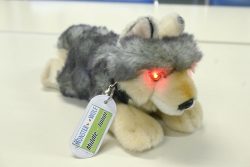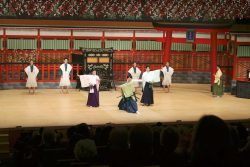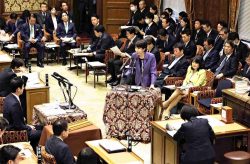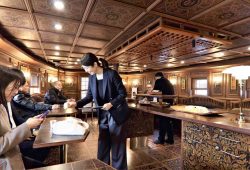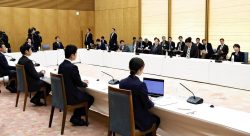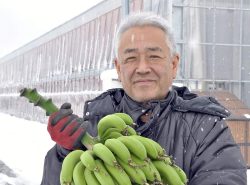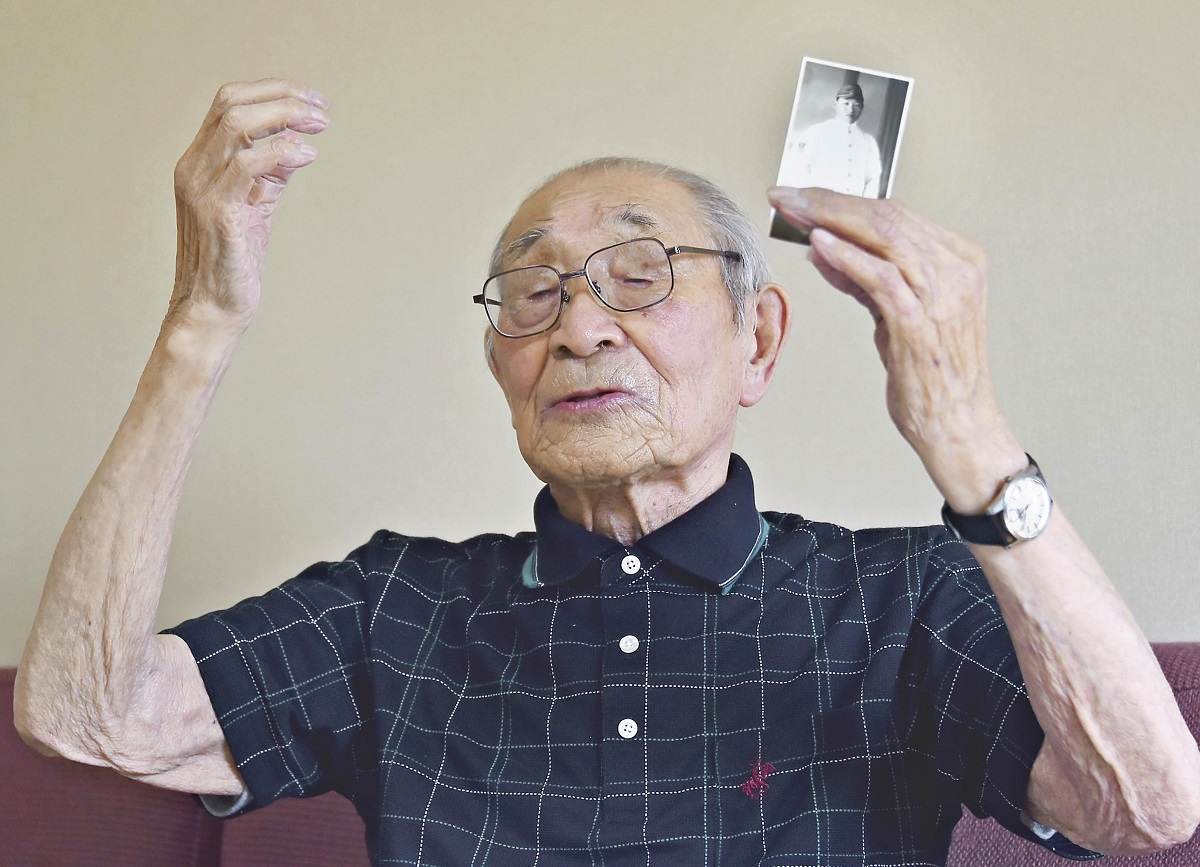
Kazuo Nakagawa, along with a photograph of his wartime self, speaks in Shiranuka, Hokkaido, on July 21.
14:37 JST, August 15, 2023
A 101-year-old man who participated in the Battle of Leyte Gulf — a key event in Japan’s World War II defeat — has spoken publicly for the first time about his experiences in hopes of raising awareness about the futility of war in the wake of Russia’s invasion of Ukraine.
Kazuo Nakagawa survived the 1944 Philippines-based ocean conflict, in which the Imperial Japanese Navy was effectively nullified by U.S. forces.
Nakagawa, a resident of Shiranuka, Hokkaido, has rarely spoken of his wartime experiences — even to his family. However, upon seeing young men fighting on the front lines following Russia’s invasion of its smaller neighbor, he felt compelled to recall his own wartime experiences, he said.
Nakagawa recently delivered a war-themed lecture in his hometown, using emotive words and dramatic gestures to evoke his past. “The torpedo came by with a swoosh, hit the ship and exploded with a boom,” he said.
In October 1944, the then 22-year-old Nakagawa was serving aboard the heavy cruiser Takao when it departed Brunei for the Leyte Gulf — where U.S. landing forces were amassing — along with the Yamato and Musashi battleships.
Looking back on that period, Nakagawa said his eyesight was so good, he was once assigned to search for underwater mines in the dark.
While using a telescope to locate U.S. submarines, Nakagawa spotted a fast-moving surface wave about 600 meters to the right of his vessel. “Torpedo!” he recalls shouting loudly.
The missile hit the central part of the ship’s hull, causing a huge column of water to rise up and rain down upon the vessel’s personnel. When another underwater projectile hit the ship’s stern, the 200-meter-long vessel tilted sharply to the right.
“We’re all going down,” Nakagawa remembers thinking.
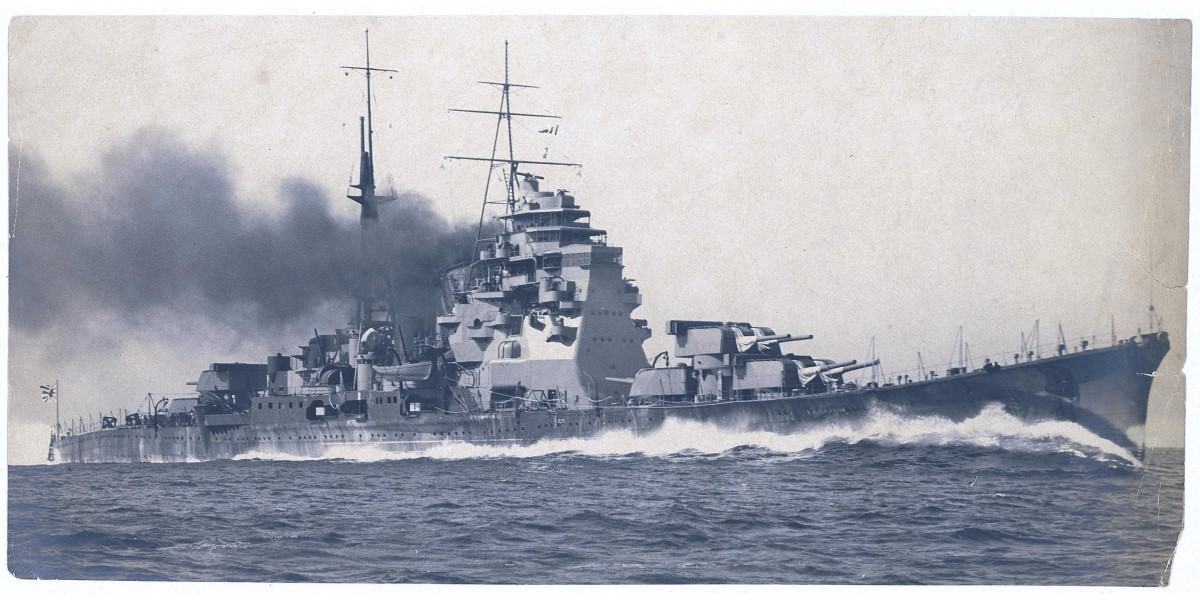
Heavy cruiser Takao
‘Dying for the nation’
Nakagawa was born in Hokkaido, the eldest son of a farming family, and conscripted around age 20. At that time, there was a prevailing belief that it was natural to die for the nation and Nakagawa says he was determined to shout “Tennoheika, banzai!” (Long live the emperor!) when his time came.
However, when the ship hit trouble, Nakagawa’s thoughts turned to his mother, he recalls.
Though the Takao escaped sinking, its rudder failed, rendering it temporarily stranded. The battle claimed the lives of 33 of Nakagawa’s shipmates and wounded many more.
Nakagawa recalls a colleague who suffered burns all over his body crying out: “I’m in so much pain; let me die!” Nakagawa and his fellows fanned him down in attempt to ease his pain, but he died three days later.
The Takao was later taken to Singapore for repairs, and the war ended while Nakagawa was there.
After the war, Nakagawa returned to his hometown and became a dairy cattle farmer. He had four children and is now a great-grandfather.
However, even after living for over a century, he confesses to still being haunted by his wartime past.
“When I first set off to war, I thought I wasn’t afraid to die,” he recounts. “But when the possibility of death arose, I was really scared. War is a miserable, stupid thing.”
In the Battle of Leyte, the Japanese fleet poured its energies into holding off the U.S. forces that were gradually closing in on Japan from the south. But lacking sufficient aerial support, the Japanese ships were helpless, and many, including the Musashi, were sunk.

Another perspective
At the time of the battle, Toshio Yoshii, now 96, was a crew member on the heavy cruiser Myoko, which was sailing about 4 kilometers from Nakagawa’s ship. Yoshii recalls his 17-year-old self, running up the stairs to escape a deluge of seawater after a torpedo hit close to his post in the generator room.
“If the torpedo had hit 3 meters further back, I’d have been killed,” he notes.
When he reached the deck, Yoshii looked across the water and saw the Musashi engulfed in flames. Oil on the sea surface had caught fire, too, making it impossible for other vessels to approach.
Yoshii remembers watching the demise of the ship and thinking, “So this is war…”
Following the war, Yoshii ran a coffee shop in Yokohama. Over time, prompted by his customers, he has gradually started to open up about his experiences off the coast of the Philippines. This year, he delivered his first public talk on the issue.
“I’ll continue sharing my experiences in the hope that people will realize that war should be avoided at all costs,” he said.
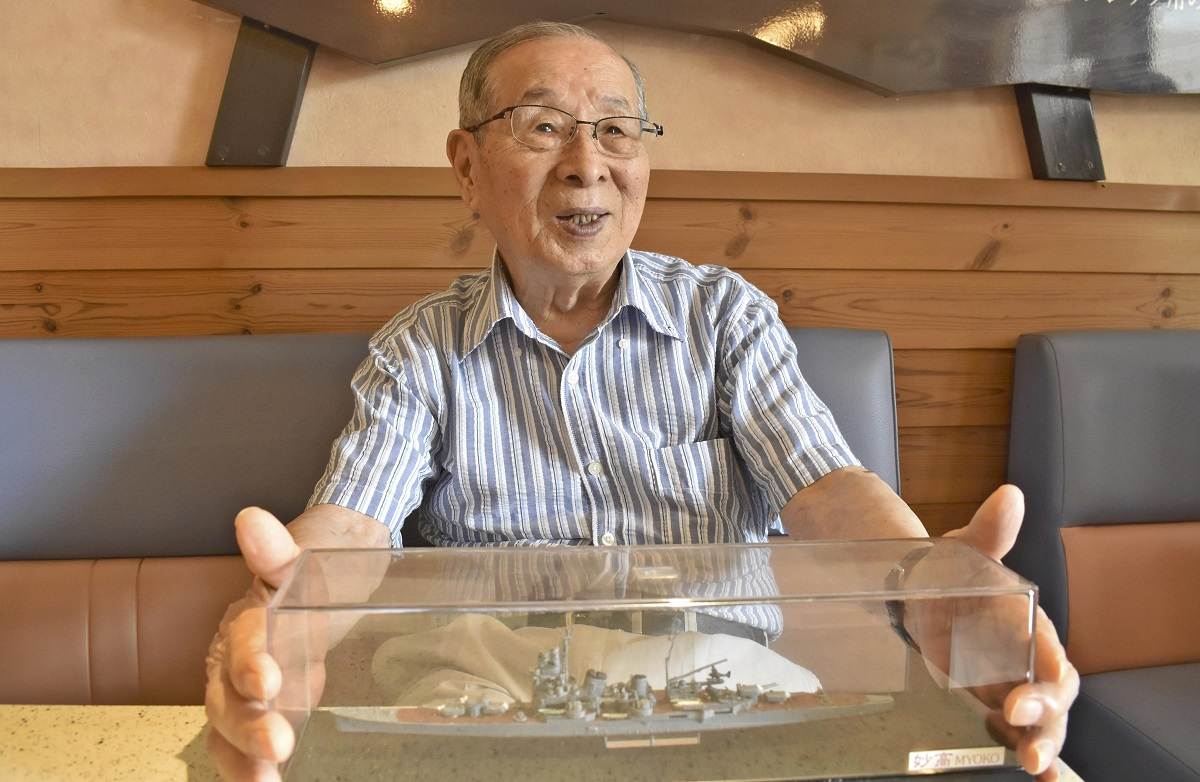
Toshio Yoshii talks about his experience with a model of heavy cruiser Myoko in his hands in Yokohama on July 19.
Top Articles in Society
-

Producer Behind Pop Group XG Arrested for Cocaine Possession
-

Man Infected with Measles Reportedly Dined at Restaurant in Tokyo Station
-

Man Infected with Measles May Have Come in Contact with Many People in Tokyo, Went to Store, Restaurant Around When Symptoms Emerged
-

Woman with Measles Visited Hospital in Tokyo Multiple Times Before Being Diagnosed with Disease
-

Australian Woman Dies After Mishap on Ski Lift in Nagano Prefecture
JN ACCESS RANKING
-

Producer Behind Pop Group XG Arrested for Cocaine Possession
-

Japan PM Takaichi’s Cabinet Resigns en Masse
-

Man Infected with Measles Reportedly Dined at Restaurant in Tokyo Station
-

Israeli Ambassador to Japan Speaks about Japan’s Role in the Reconstruction of Gaza
-

Videos Plagiarized, Reposted with False Subtitles Claiming ‘Ryukyu Belongs to China’; Anti-China False Information Also Posted in Japan



